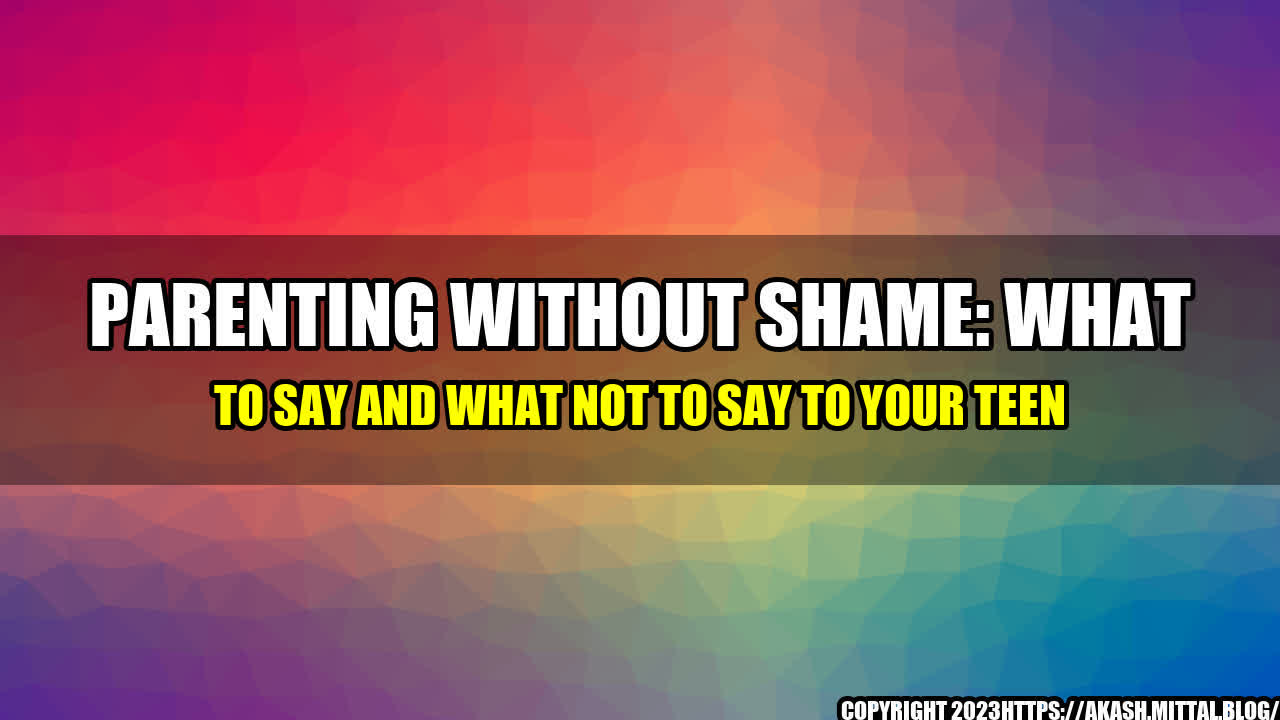Introduction
As a parent, one of the most challenging aspects of raising a teenager is knowing what to say and what not to say. Teenagers are at a critical stage in their lives where they are trying to figure out who they are and where they fit in the world. As their parent, it is your job to help guide them on this journey, but it is essential to do so without shaming or judging them.
In this article, we will explore some of the things that you should and should not say to your teen in order to foster positive relationships and help them grow into happy, healthy adults.
What Not to Say to Your Teen
The teenage years are a time of great change and uncertainty, which can lead to feelings of insecurity and vulnerability. It is important to be mindful of the words and phrases that you use when talking to your teen, as they can have a significant impact on their self-esteem and sense of worth.
"You're so lazy"
Calling your teen lazy is not only hurtful, but it is also counterproductive. Teenagers are still developing their sense of responsibility and motivation. Instead of putting them down, try to understand the reasons behind their behavior and work together to find a solution.
"Why can't you be more like (insert name here)?"
Comparing your teen to others is a recipe for disaster. It can lead to resentment, low self-esteem, and feelings of inadequacy. Instead of focusing on what they are not, try to encourage and build on their strengths.
"You're not trying hard enough"
Teenagers are under a lot of pressure to perform academically, socially, and athletically. Instead of piling on the pressure, try to be supportive and understanding. Let them know that you are there to help, no matter what the outcome.
"You're being ridiculous"
Teens are still learning about their emotions and how to express themselves. Dismissing their feelings as ridiculous or over-the-top can make them feel invalidated and unheard. Instead, try to listen to what they are saying and empathize with their perspective.
"I can't believe you did that"
Shaming your teen for their mistakes can be tempting, but it is important to remember that they are still learning and growing. Instead of focusing on the negative, try to help them learn from their mistakes and move forward in a positive direction.
What to Say to Your Teen
Now that we have discussed some of the things that you should avoid saying to your teen, let's look at some of the things that you should say.
"I love you"
Teenagers need to know that they are loved unconditionally. Saying "I love you" regularly can help build a strong foundation of trust and support.
"How can I help?"
Being there for your teen when they need you is one of the most important things you can do as a parent. By asking "How can I help?" you are letting them know that you are there for them no matter what.
"I'm proud of you"
Teens need to know that their efforts are appreciated and valued. By telling them that you are proud of them, you are boosting their self-esteem and sense of accomplishment.
"Tell me more about how you feel"
Teenagers are still learning how to process and express their emotions. By asking them to elaborate on their feelings, you are giving them the opportunity to explore their emotions and feel heard.
"I'm sorry"
As parents, we are not perfect. There may be times when we say or do something hurtful. Apologizing to your teen when you make a mistake shows them that it is okay to make mistakes and that you respect and value their feelings.
Conclusion
- Parenting without shame is a way to help your teen grow into a happy, healthy adult. It is important to be mindful of the words and phrases that you use when talking to them.
- Avoid phrases like "You're so lazy", "Why can't you be more like (insert name here)?", "You're not trying hard enough", "You're being ridiculous", and "I can't believe you did that".
- Say things like "I love you", "How can I help?", "I'm proud of you", "Tell me more about how you feel", and "I'm sorry".
As a parent of two teenagers, I can attest to the power of words. One day, my son came home from school feeling down about a test he had failed. I could have easily said something like "You should have studied more" or "Why can't you be more like your sister?", but instead, I said, "I'm sorry you had a tough day. How can I help you study for your next test?" This led to a productive conversation about study habits and resulted in my son feeling supported and motivated to do better.

Curated by Team Akash.Mittal.Blog
Share on Twitter Share on LinkedIn